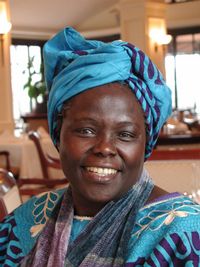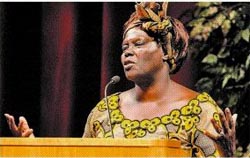
Last Night I had the wonderful opportunity of attending Wangari Maathai’s lecture at The University of Buffalo with J. David Swift of the Green Party of Cattaraugus County. Wangari is the winner of the 2004 Nobel Peace Prize, the Founder of the Green Belt Movement, and the Founder of the Green Party of Kenya.

Make sure you pick up her new book Unbowed to read more about her inspiring story.
Below is an article about the lecture in today’s Buffalo News.
Blending peace, environmentalism
Nobel laureate talks about tree-planting project in Kenya
By HAROLD McNEIL
News Staff Reporter
2/3/2007

Bill Wippert/Buffalo News
Wangari Maathai, Nobel Peace Prize winner and founder of the Green Belt Movement, addresses the crowd in UB's Center for the Arts.
Nobel Peace Prize winner Wangari Maathai germinated a simple idea that resulted in the planting of 20 million trees in her native Kenya.
That idea reduced soil erosion and helped to shore up countryside economies that depend on the trees for sustenance.
Maathai was the keynote speaker for the 31st annual Martin Luther King Jr. Commemoration Event on Friday evening in Mainstage Theatre at the Center for the Arts on the University at Buffalo North Campus.
It was while serving in the National Council of Women that Maathai was introduced to the idea of planting trees with women's groups to help the environment and improve their quality of life.
In 1986, she created the Pan-African Green Belt Network, and the tree-planting idea has taken root in several other African countries, including Ethiopia, Zimbabwe and Tanzania.
She was attending a conference in Mexico and heard women from rural villages like hers complaining about the loss of an important resource - trees.
"They were talking about matters of life and death, while I was talking about luxuries," Maathai said.
As a result, she latched onto the idea of reforestation, germinating seedlings and planting saplings one at a time.
"It was a wonderful symbol because it was easy," she said.
However, it was not always easy dealing with professional foresters who, she said, made the task difficult by fussing over issues like soil and seed quality. She and her followers chose a more common-sense approach.
"You gather seeds, let them dry and put them in the ground. If they're good, they'll germinate. If they're not good, they will not germinate. And so, we started teaching ourselves," Maathai said.
There also were concerns about nurturing the plants.
"If you don't take care of them, no trees will ever show because they all die," Maathai said.
"There are programs, especially in Africa, that have been tried but nothing comes from them, because people plant the trees and walk away from them. You can't. You plant and you help to take care of them. So we needed the women to stay with the trees and . . . came up with an incentive. So if you made your tree survive, you get compensated financially," she said.
She mixes her brand of environmentalism with a healthy dose of advocacy for democracy and human rights.
Maathai, who has served as Kenya's deputy environment minister, has spent the better part of her life on a mission to protect the environment and human rights.
Over the last three decades she has campaigned against government oppression and, in 1987, founded Kenya's Green Party. She also endured arrests and beatings for protesting former President Daniel Arap Moi's environmental policies and human rights record.
"In order to live in peace with each other, we need to manage our limited resources more responsibly and accountably [and] we need to share these resources more equitably," she told the UB audience.
"But in order for us to be able to do that, we need to govern ourselves [in a] system that allows for respect for human rights."
Maathai earned a degree in biological sciences from Mount St. Scholastic College in Atchison, Kansas, in 1964, later earning her master of science degree at the University of Pittsburgh before completing doctoral studies in Germany and at the University of Nairobi in Kenya.
She has served on the Commission on Global Governance and Commission on the Future.
In 2004 she was awarded the Nobel Peace Prize.
She is the first black African woman to win the Nobel Prize in any category since the beginning of the award in 1901.
e-mail: hmcneil@buffnews.com

No comments:
Post a Comment